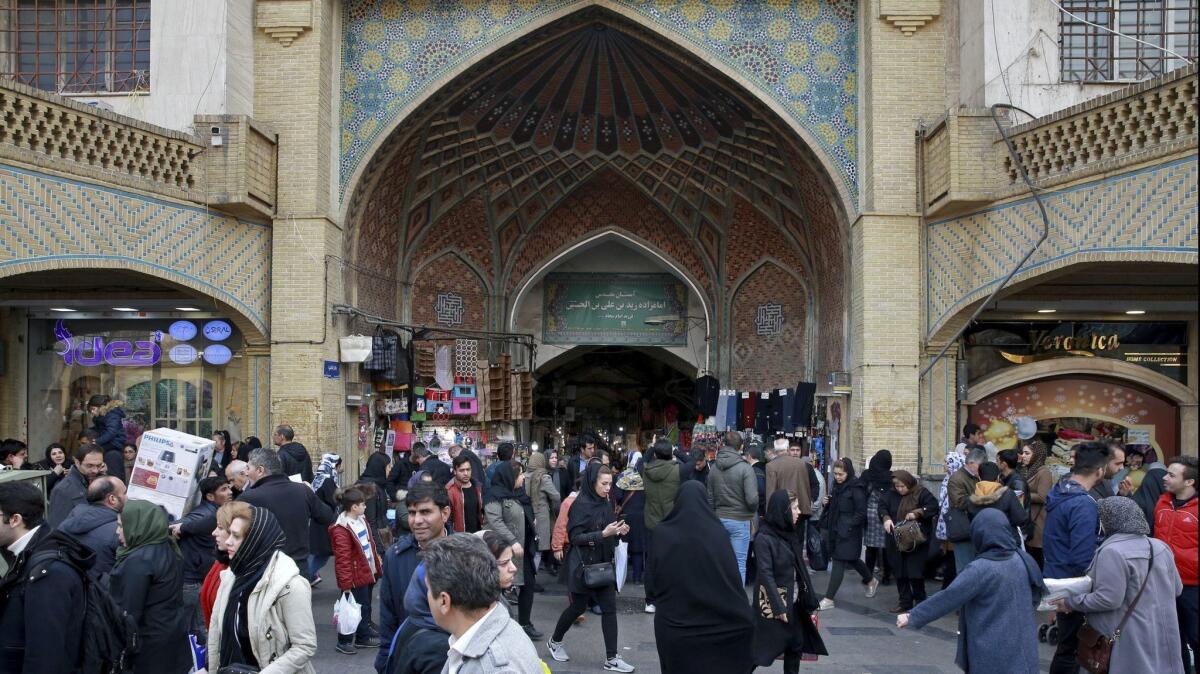Column: Trump’s sanctions are hurting Iran’s economy, but that doesn’t mean they’re working

- Share via
Reporting from Washington — President Trump claims his economic sanctions on Iran are the “toughest ever” and that his policy of maximum pressure is already a success.
But his own intelligence chiefs don’t agree. In their view, Iran’s behavior may be getting worse, not better.
There’s a paradox at the heart of Trump’s policy. His sanctions are tougher than many skeptics expected. And they’ve been effective in one sense: They helped pitch Iran into a recession.
But creating economic pain isn’t the goal. The goal is to force Iran to improve its conduct — to accept stricter limits on missiles, to accept a nuclear deal more onerous than the accord Trump abandoned, and to stop what the White House calls “malign” activities across the Middle East.
That hasn’t happened. Instead, as the CIA and other U.S. intelligence agencies told Congress recently, the latest sanctions may have strengthened hard-liners in Tehran.
The U.S. penalties prompted European firms and international banks to flee Tehran. Oil exports, Iran’s main source of income, have fallen by 60%. The International Monetary Fund projects that the once-growing economy will shrink 3.6% this year.
That’s impressive, especially since the European Union and other countries opposed the sanctions. Most foreign policy experts say that unilateral sanctions don’t work and that only multilateral efforts can succeed.
“These sanctions have surprised people by how effective they’ve been,” Elizabeth Rosenberg, who worked on Iran sanctions in the Obama administration, told me.
But Trump’s victory claims go far beyond economic distress in Tehran.
“When I took over two years ago, Iran was going to take over the Middle East,” the president said last month. “They were going to have all the nuclear weapons they wanted in a very short period of time.”
“Iran is a much different country right now,” he said. “They’re having riots every week, in every city — bigger than they’ve ever had before. Their currency is under siege thanks to us. A lot of bad things are happening. When we do all of the things that we’ve done monetarily to Iran, Iran is in trouble.”
His intelligence chiefs effectively dismissed those boasts in their annual report to Congress on worldwide threats.
They said Iran wasn’t moving toward nuclear weapons when Trump took office. Instead, thanks to the 2015 nuclear accord signed by President Obama, Tehran was further from acquiring nukes than before.
Iran’s drive to expand its footprint in the Middle East is getting worse, not better, the spy chiefs said, partly a result of Trump’s efforts to withdraw U.S. troops from Syria.
“We assess that Iran will attempt to translate battlefield gains in Iraq and Syria into long-term political, security, social and economic influence,” they wrote.
And while domestic unrest will persist in Iran, they wrote, “the protests are likely to remain uncoordinated and lacking central leadership or broad support.”
In sum, the sanctions haven’t accomplished their principal goals — at least not yet.
Part of the problem is that the sanctions could still be tougher. The White House says it wants to reduce Iran’s oil exports to zero; that hasn’t happened because eight of Tehran’s customers including China, India and Japan cut deals to reduce their purchases gradually.
Moreover, the Islamic Republic has 40 years’ experience surviving economic sanctions — and evading them. Tehran’s strategy is familiar: It is trying to wait Trump out and hoping for a less confrontational president after the 2020 election.
But the White House has a problem of its own: It hasn’t set a clear and achievable diplomatic goal.
Instead, it has proposed multiple ambitious goals: negotiating a new agreement on nuclear and nonnuclear weapons, changing Iran’s behavior in the Middle East, and helping the Iranian people choose a better government.
That last goal is sometimes called, less politely, “regime change.”
Trump says he wants to talk face to face with Iran’s leaders, just as he has with North Korea’s Kim Jong Un. “I’d love to negotiate with Iran,” the president said last month.
But his secretary of state, Michael R. Pompeo, and his national security advisor, John Bolton, often sound as if they’re yearning for regime change. Not surprisingly, Iranian officials see them as a threat.
When Pompeo listed specific U.S. goals last year, it added up to a demand that the Tehran government abandon virtually all its policies.
Pompeo said economic sanctions would come off only if Iran accepted stricter limits on nuclear research and missile development, withdrew its forces from Syria, ended support for pro-Iranian groups in other countries, halted verbal threats against Israel, and made substantial improvements on human rights at home.
Iranian officials laughed that off as a demand for capitulation.
Trump is right on several counts: Negotiations are a good idea. Limits on Iran’s military activities are a worthy goal. So is improving Iran’s appalling record on human rights.
But sanctions are only a first step toward those ends. Trump needs to let Iran’s rulers know that there’s something in it for them — just as he has with North Korea.
Until then, no matter what Trump says, his sanctions are unlikely to succeed.
More to Read
Get the L.A. Times Politics newsletter
Deeply reported insights into legislation, politics and policy from Sacramento, Washington and beyond. In your inbox three times per week.
You may occasionally receive promotional content from the Los Angeles Times.











